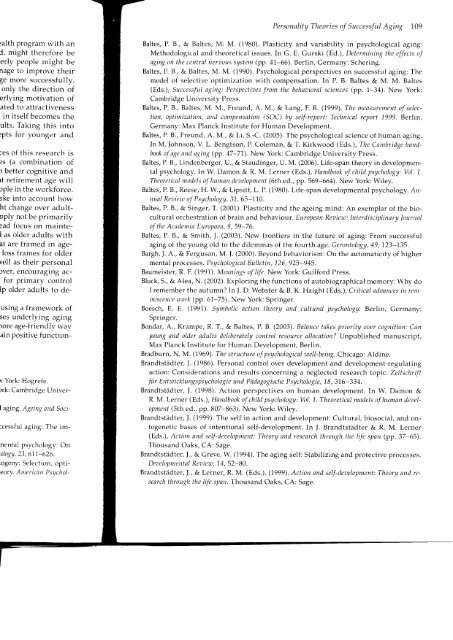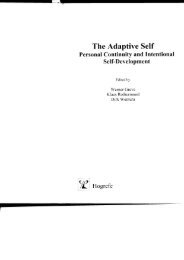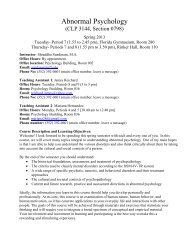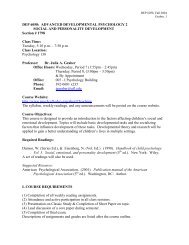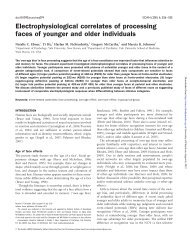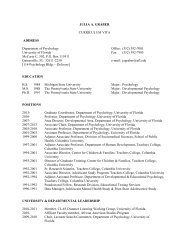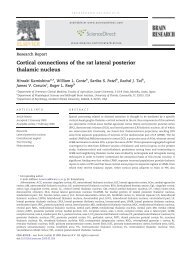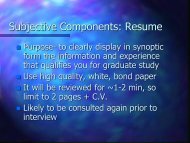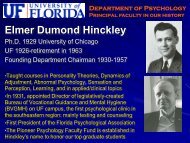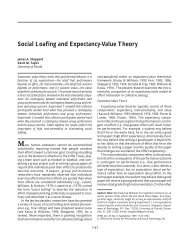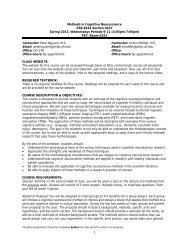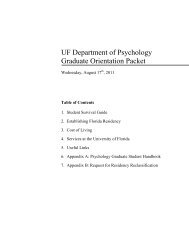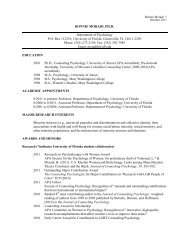Personality theories of successful aging - University of Florida ...
Personality theories of successful aging - University of Florida ...
Personality theories of successful aging - University of Florida ...
You also want an ePaper? Increase the reach of your titles
YUMPU automatically turns print PDFs into web optimized ePapers that Google loves.
<strong>Personality</strong> Theories <strong>of</strong> Sttccessful Aging 109<br />
)alth program with an<br />
J, might therefore be<br />
erly people might be<br />
nage to improve their<br />
ge more <strong>successful</strong>ly.<br />
only the direction <strong>of</strong><br />
erlying motivation <strong>of</strong><br />
ated to attractiveness<br />
in itself becomes the<br />
ults. Taking this into<br />
:pts for younger and<br />
:es <strong>of</strong> this research is<br />
:s (a combination <strong>of</strong><br />
r better cognitive and<br />
tt retirement age will<br />
rple in the workforce.<br />
lke into account how<br />
ht change over adultnply<br />
not be primarily<br />
:ad focus on mainte-<br />
I as older adults with<br />
at are framed in ageloss<br />
frames for older<br />
vell as their personal<br />
)ver/ encour<strong>aging</strong> acfor<br />
primary control<br />
Ip older adults to deusing<br />
a framework <strong>of</strong><br />
ses underlying <strong>aging</strong><br />
rore age-friendly way<br />
ain positive functionv<br />
York: Hogrefe.<br />
>rk: Cambridge Univer-<br />
I <strong>aging</strong>. Ageing and Soci-<br />
:cessful <strong>aging</strong>: The imnental<br />
psychologv: On<br />
ology, 23, 611-626.<br />
:ogeny: Selection, optieory.<br />
Arne r ic nn P sy chol -<br />
Baltes, P. B., & Baltes, M. M. (1980). Plasticity and variability in psychological <strong>aging</strong>:<br />
Methodological and theoretical issues. In G. E. Gurski (Ed.), Determining the effects <strong>of</strong><br />
<strong>aging</strong> on the central neraousystem (pp. 41,-66). Berlin, Germany: Schering.<br />
Baltes, P. 8., & Baltes, M. M. (1990). Psychological perspectives on <strong>successful</strong> <strong>aging</strong>: The<br />
model <strong>of</strong> selective optimization with compensation. In P. B. Baltes & M. M. Baltes<br />
(Eds.), Successftrl <strong>aging</strong>: Perspectiues from the behaaioral sciences (pp. 1-3a). New York:<br />
Cambridge <strong>University</strong> Press.<br />
Baltes, P. B., Baltes, M. M., Freund, A. M., & Lang, F. R. (1999). The measurement <strong>of</strong> selection,<br />
optimization, and compensation (SOC) by self-report: Technical report 1999. Berlin,<br />
Germany: Max Planck Institute for Human Development.<br />
Baltes, P. B., Freund, A. M., & Li, S.-C. (2005). The psychological science <strong>of</strong> human <strong>aging</strong>.<br />
In M. Johnson, V. L. Bengtson, P. Coleman, & T. Kirkwood (Eds.), The Cambridge handbook<br />
<strong>of</strong> age and <strong>aging</strong> (pp. a7-71). New York: Cambridge <strong>University</strong> Press.<br />
Baltes, P. B., Lindenberger, U., & Staudinger, U. M. (2006). Life-span theory in developmental<br />
psychology. In W. Damon & R. M. Lerner (Eds.), Handbook <strong>of</strong> child psychology: Vol. 1.<br />
Theoretical models <strong>of</strong> human deztelopment (6th ed., pp. 569-664). New York: Wiley.<br />
Baltes, P. B., Reese, H. W., & Lipsitt, L. P. (1980). Life-span developmental psychology. Annual<br />
Reaiew <strong>of</strong> Psychology, 31, 65-110.<br />
Baltes, P. B., & Singer, T. (2001). Plasticity and the ageing mind: An exemplar <strong>of</strong> the biocultural<br />
orchestration <strong>of</strong> brain and behaviou r. European Reaiezu: Interdisciplinary lournal<br />
<strong>of</strong> the Academia Europaen, 9,59-76.<br />
Baltes, P. 8., & Smith, J. (2003). New frontiers in the future <strong>of</strong> <strong>aging</strong>: From <strong>successful</strong><br />
<strong>aging</strong> <strong>of</strong> the young old to the dilemmas <strong>of</strong> the fourth age. Gerontology, 49,123-135.<br />
Bargh, J. A., & Ferguson, M. J. (2000). Beyond behaviorism: On the automaticity <strong>of</strong> higher<br />
mental processes. Psychological Bulletin, 126, 925-945.<br />
Baumeister, R. F. (1991). Meanings <strong>of</strong> life. New York: Guilford Press.<br />
Bluck, S., & Alea, N. (2002). Exploring the functions <strong>of</strong> autobiographical memory: Why do<br />
I remember the autumn? In f . D. Webster & B. K. Haight (Eds.), Critical adoances in rentiniscence<br />
work (pp.61-75). New York: Springer.<br />
Boesch, E. E. (1991). Symbolic action theory and cultural psychology. Berlin, Germany:<br />
Springer.<br />
Bondar, A., Krampe, R. T., & Baltes, P. B. (2003). Balance takes priority oaer cognition: Can<br />
young and older adults deliberately control resource allocation? Unpublished manuscript,<br />
Max Planck Institute for Human Development, Berlin.<br />
Bradburn, N. M. (1969). The structure <strong>of</strong> psychological well-being. Chicago: Aldine.<br />
Brandtstlidter, J. (1986). Personal control over development and development-regulating<br />
action: Considerations and results concerning a neglected research topic. Zeitschrift<br />
fiir Ent w i ck lu ngsp s y ch ol o gi e un d P ii d ago g isch e P sy c holo g ie, 18, 376 -334.<br />
Brandtstddter, f. (1998). Action perspectives on human development. In W. Damon &<br />
R. M. Lerner (Eds.), Handbook <strong>of</strong> child psychology: VoL 1. Theoretical models <strong>of</strong> human deuelopment<br />
(5th ed., pp. 807-863). New York: Wiley.<br />
Brandtstiidter, J. Q999). The self in action and development: Cultural, biosocial, and ontogenetic<br />
bases <strong>of</strong> intentional self-development. In J. Brandtstiidter & R. M. Lerner<br />
(Eds.), Action and self-deaelopment: Theory and research through the life span (pp.37-65).<br />
Thousand Oaks, CA: Sage.<br />
Brandtstiidter, f., & Greve , W. (1994). The <strong>aging</strong> self: Stabiiizing and protective processes.<br />
Deael opm e ntal Reai eu, 14, 52-80.<br />
Brandtstddter,J., & Lerner, R. M. (Eds.).(1999).<br />
Action and self-deztelopment: Theory and research<br />
throttgh the life span. Thousand Oaks, CA: Sage.


